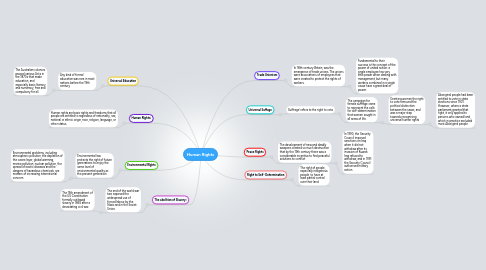
1. The abolition of Slavery:
1.1. The end of the world war two exposed the widespread use of forced labour by the Nazis and in the Soviet Union.
1.1.1. The 13th amendment of the US Constitution formally outlawed slavery in 1865 after a devastating civil war.
2. Human RIghts:
2.1. Human rights are basic rights and freedoms that all people are entitled to regardless of nationality, sex, national or ethnic origin, race, religion, language, or other status.
3. Universal Education
3.1. Any kind of formal education was rare in most nations before the 19th century
3.1.1. The Australian colonies passed various Acts in the 1870s that made education, and especially basic literacy and numeracy, free and compulsory for all.
4. Environmental RIghts
4.1. Environmental law protects the right of future generations to enjoy the same level of environmental quality as the present generation
4.1.1. Environmental problems, including atmospheric pollution, the depletion of the ozone layer, global warming, marine pollution, nuclear pollution, the spread of exotic diseases and the dangers of hazardous chemicals, are matters of increasing international concern
5. Trade Unionism
5.1. In 18th-century Britain, was the emergence of trade unions. The unions were associations of employees that were created to protect the rights of workers.
5.1.1. Fundamental to their success is the concept of the power of united action: a single employee has very little power when dealing with management, but many workers combined in a single cause have a great deal of power.
6. Universal Suffage
6.1. Suffrage’ refers to the right to vote
6.1.1. The campaign for female suffrage came to represent the calls for self-determination that women sought in all areas of life.
6.1.1.1. Granting women the right to vote removed the political distinction between the sexes, and was a major step towards recognising universal human rights
6.1.1.1.1. Aboriginal people had been entitled to vote in state elections since 1901. However, where a state parliament granted that right, it only applied to persons who owned land, which in practice excluded most Aboriginal people
7. Right to Self- Determination
7.1. The right of people, especially indigenous people, to have at least partial control over their land.
8. Peace Rights
8.1. The development of new and deadly weapons created so much destruction that by the 19th century there was a considerable incentive to find peaceful solutions to conflict
8.1.1. In 1990, the Security Council imposed sanctions on Iraq when it did not withdraw after its invasion of Kuwait. Iraq refused to withdraw, and in 1991 the Security Council authorised military action

